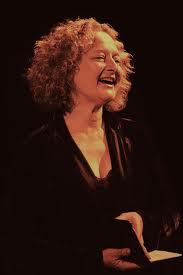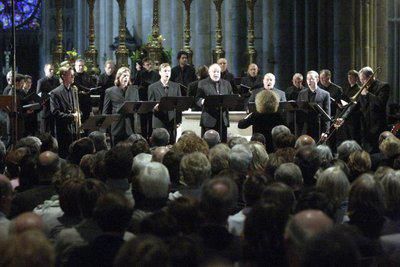Classical Music Review: The Boston Camerata Tackles the Snarly Complexity of the “Messe de Notre Dame”
The Boston Camerata proffers a constant sense of discovery and rediscovery, of unusually lively musicianship and scholarship, and a sprightly sense of the humanity—and the snarly complexity—behind the music it performs.
By Susan Miron
Messe de Notre Dame (Mass of Our Lady) by Guillaume de Machaut (1300–1377), performed by The Boston Camerata last Saturday night at the neo-Gothic St. John’s Memorial Chapel in Cambridge, MA, was not only a sold-out affair but an artistic triumph. Two years ago, Anne Azéma, The Boston Camerata’s music director, was asked about ways to celebrate the 800th anniversary of the famous cathedral in the French city of Reims. Ms. Azéma proposed Mauchaut’s famed Messe de Notre Dame. The Camerata’s performance in Reims was an unqualified success, and the same could be said of the performance Saturday night, which was the second performance of this version in the U.S.
Ms. Azéma explained before the 50-minute performance that, in truth, this mass was meant to be performed in a small chapel like St. John’s, and that it was never intended to be heard by the public. It was, she argued, a virtuoso piece for stellar male singers, though this conclusion is speculative, given the inevitable amount of guesswork regarding performance practices in the period. Musicians can read the pitches and rhythms, but Azéma asks, “Do we sing it high or low?” Machaud’s was the earliest known polyphonic setting of the mass Ordinary from the pen of a single composer. Tempi and dynamics were rarely, if ever, specifically designated in that period. Performing a 650-year-old work raises a plethora of questions that scholarship will never be able to definitively decide.
It is strongly believed that Reims Cathedral is where this work of slowly seductive beauty was first performed, perhaps around 1360. Machaut’s Ordinary, dedicated to the Virgin Mary, contained six movements, sung by six men from the Camerata: Michael Barrett, Timothy Leigh Evans, Daniel Hershey, and Eric Mentzel, tenors; Joel Nesvadba, baritone, and Donald Wilkinson, bass-baritone (who was replacing an ailing Paul Guttry). When they added Mr. Wilkinson, the Camerata also brought in a pair of excellent sackbuttists, Brian Kay and Steven Lundahl. (Sackbuts were early trombones that made a smoother, less brassy sound than the later version of the instrument.) The sackbuts added greatly to the compelling color and texture of the performance, which featured absolutely brilliant singers.
Azéma’s decision to intersperse movements of the mass (of polyphonic singing) with surrounding movements of Gregorian chants sung by the excellent Convivium Musicum provided the Mass with both a aesthetic and musical context. It was, she writes, “like fitting ‘a jewel in its case.'” The Convivium was directed by the very busy Michael Barrett, who shuttled between conducting his group (Noah Bullock, Christopher Chase, Michael Dettelbach, T. Jefferson Kline, Christopher Laumer, John Nesby, and Dan Schenk) and singing tenor with the Camerata. He did both very well, indeed. The Camerata and its sackbuts formed a semi-circle facing the audience in the front; the Convivium stood in a circle in back of them.
Azéma writes that Marchaut’s music “was never intended as a work to be heard in isolation. . . (but rather as) part of a larger context: the ‘novel’ polyphony contrasting with the familiar Gregorian monodies. . . Heard together, chants and polyphony create a new whole, a unique spiritual, emotional and artistic itinerary for the listener.” The performance made that heavenly trip beautifully clear. It has taken me many years to catch up with The Boston Camerata. Now I plan on never missing a concert. This is a group that proffers a constant sense of discovery and rediscovery, of unusually lively musicianship and scholarship, and a sprightly sense of the humanity—and the snarly complexity—behind the music it performs.


